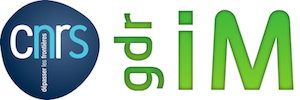Quantum Information and Quantum Computing are two emerging areas of research, and are on
their way to revolutionize our conception and implementation of computations. Recently, many efforts
were deployed to unite Quantum Information, Quantum Computing and Machine Learning.
They have largely been centered on integrating quantum algorithms and quantum information processing
into machine learning architectures [2].
Our approach is quite the opposite. We use Machine Learning techniques to study and classify
Quantum Entanglement, a key ressource in Quantum Computing. In our work, we train Artificial
Neural Networks to learn algebraic varieties, defined by polynomial equations, that characterize and
describe different entanglement classes for pure states [3].
Inspired by the work of Breiding et al. [4], we focus on determining the membership of a state
to an algebraic variety, instead of determining the defining intrinsic equations. By sampling tensors
living inside and outside a given algebraic variety, we are able to train ReLU networks to classify
such tensors. In the case of varieties defined by homogeneous polynomials, we also design and train
hybrid polynomial networks [5].
We give examples for detecting separable states, degenerate states, as well as border rank classification
for up to 5 qubits and 3 qutrits.
- Poster

 PDF version
PDF version
